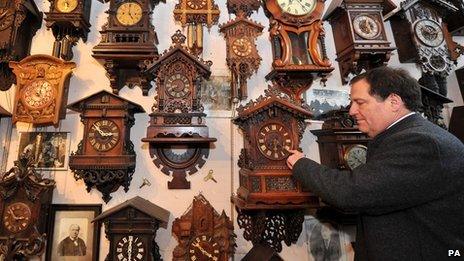Time change would benefit Scotland, claims report
- Published

The Scottish government says changing the current system would adversely affect Scotland
Switching Scotland to Central European Time would reduce road casualties, improve health and boost the economy, according to new research.
A report by the Policy Studies Institute (PSI) claimed shifting the clocks forward by one hour all year round would benefit Scotland.
It said the limited number of daylight hours north of the border must be used "as efficiently as possible".
But the Scottish government said it opposed any change.
The report has suggested a switch to Single/Double Summer Time (SDST), where winter would be one hour ahead of Greenwich Mean Time (GMT) and summer time would be two hours ahead of GMT.
This would mean it would get lighter an hour later than at present in the morning, and darker an hour later than is currently the case in the evening.
The report claimed the switch would boost the leisure and tourism industries through increased revenue and job generation.
It also argued that more accessible daylight hours could improve the nation's health by boosting opportunities for outdoor activity.
And it claimed putting clocks forward by one hour would be likely to reduce road casualties in Scotland as more journeys home in the evening would be able to be made in daylight.
The report concluded that advancing the clocks by an hour would be beneficial for Scotland precisely because of the limited number of daylight hours it receives in the winter.
The report's author, Dr Mayer Hillman, said: "For Scottish children, there would be a yearly increase of about 200 daylight hours, with roughly half of these falling on school days.
"Advancing the clocks by an hour, in real terms, would bring a further 50 hours of 'available' sunshine for children and 75 hours for adults in Scotland each year."
But the Scottish government said changing the current system would adversely affect Scotland.
A spokesman said: "The impact would be felt by rural communities and outdoor workers and businesses, while reduced daylight between 8am and 9am in Scotland could potentially increase the danger for children travelling to school in the dark."
Scottish Secretary Michael Moore also opposed a shift in Scotland's daylight hours.
Rebecca Harris and John Scott on changing times
A spokesman for Mr Moore commented: "The minister has sought views from a number of interested bodies in Scotland.
"It is clear that there is plenty of opposition to this proposal in Scotland.
"The majority of business and industry leaders in Scotland are against a shift to Central European Time."
Meanwhile, farmers' leaders said they did not believe that "sufficient justification" had yet been given to make a change to current arrangements.
Scott Walker, policy director at NFU Scotland, commented: "We remain sceptical about some of the arguments that have been offered in support of the change and nervous of the potential impacts, but we feel the time is right to conduct a full, independent analysis of the impact."
Road safety
The Royal Society for the Prevention of Accidents (RoSPA) welcomed the report.
It said recent research had suggested that a move to SDST could reduce UK road deaths by about 80 per year and serious injuries by about 212 per year.
A spokesman said: "The effect of SDST is to save children's lives, even more so in Scotland than in England and Wales, because Scotland has longer, darker winter evenings, which is where the principal casualties occur."
Dr John Sproule, head of sport and health sciences at the University of Edinburgh said: "I support the 'lighter-later' campaign because I believe it can enhance the health and well being of people living in Scotland.
"I think it can help increase activity levels and if current trends continue about 50% of our population will be obese by 2050.
"We need to become more proactive in trying to ensure there are more opportunities to increase activity and we know that if young people have the opportunity to go outdoors when it is lighter, then children will be more active."
At 0200 BST on 31 October, the UK will move to 0100 GMT
- Published29 October 2010
- Published29 October 2010
- Published21 June 2010